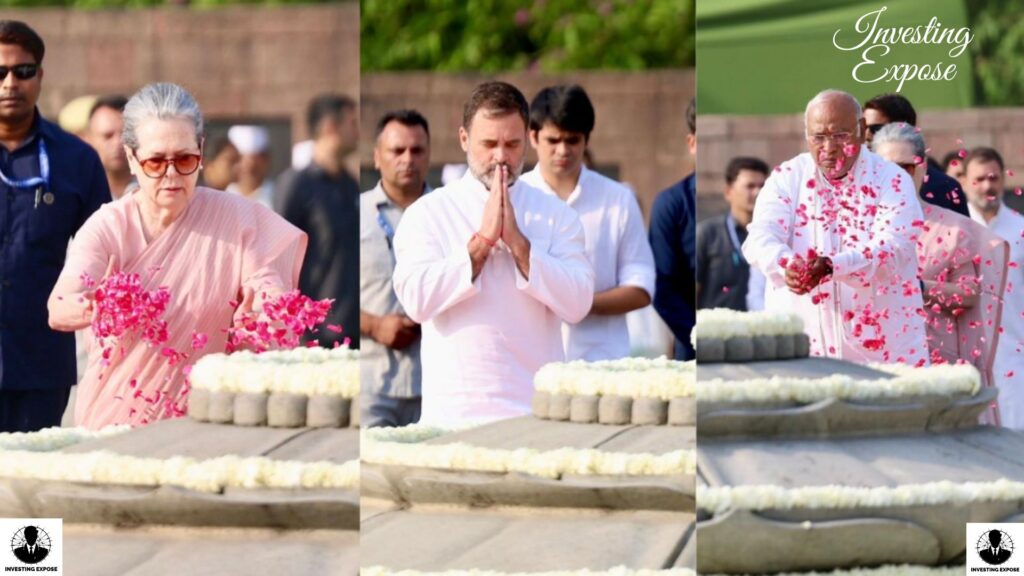Rahul Gandhi, the president of the Indian National Congress party, dedicated his speech towards the achievement of his father, the late former Prime Minister Rajiv Gandhi, who would have turned 80 years today. On a social media Internet post, Rahul referred Rajiv Gandhi as a ‘compassionate personality’ and a ‘messenger of harmony and goodwill.’
In the memory of his father, he paid a visit to Rajiv Gandhi’s memorial ’Veer Bhumi’, located in Delhi and offered the flower at the memorial. ‘Sadbhavana Diwas’ was observed by the Congress party as the whole day was dedicated to the principles of Rajiv Gandhi.
Rahul Gandhi On Rajiv Gandhi’s Anniversary
Congress leaders including GU, MP Mallikarjun Kharge, and MP Jairam Ramesh paid glowing tribute to Rajiv Gandhi and reappraised the landmark changes that he accomplished in the nation. Kharge highlighted Gandhi’s contributions towards making India ready for the 21st century though his measures to reduce voting age to 18 years, launching of Panchayati Raj, IT & telecom. Jairam Ramesh apprised that Rajiv Gandhi developed key peace accords in areas in conflict and his perspective on using science and technology to enhance the quality of life including in the social sectors particularly in supply of drinking water and immunizations.
Remembered for his vision of a modern India, progressive policies, and humane approach to leadership, Rajiv Gandhi died in May 1991 at the age of 40; he became a Prime Minister of India after the assassination of his mother, Indira Gandhi. His legacy lives on not only his family but the whole nation as well.
The tribute was, however, accompanied by a visit to Rajiv Gandhi’s memorial Veer Bhumi in Delhi where Rahul Gandhi laid wreath. This somber event was followed within the framework of the ‘Sadbhavana Diwas’ or the ‘Day of Harmony’ a day which was dedicated to the memory of the political leader and his life-long advocacy of harmony, peace and goodwill which Rajiv Gandhi stood for and promoted throughout his political career (Free Press Journal).
Rajiv Gandhi was born on 20 th August 1944, though he became the Prime Minister at the youngest age of 40 after the unfortunate death of his mother, the then Prime Minister Smt. Indira Gandhi in 1984. The times he spent as the Prime Minister from 1984 to 1989 were not long but he made earnest attempts to pre-emptively future proof India and prepare it for the new millennia. Leadership was one of the biggest strengths Rajiv Gandhi brought to the table and was a vision of technology and social change which has set up the foundations for most of the reforms seen in modern India (The New Indian Express) (Free Press Journal).
Other leaders of the Congress party also thrashing in the memory of Rajiv Gandhi on this day as well. Addressing the Congress plenary session, Congress President Mallikarjun Kharge paid glowing tribute to Rajiv Gandhi who he said had changed India in several ways including voting age lowered from 21 to 18 and Panchayati Raj system, commissioning of IT and telecom revolutions.
On this, Kharge observed that these initiatives played the role of projecting India as the leader in technology as well as demography across the globe. Other areas that we saw the influence of Rajiv Gandhi was in the education sector and the introduction of the New Education Policy of 1986 which was inclusive education that led to the setting of institutions such as the Navodaya Vidyalayas.
Many other Congress leaders, in their speeches and tributes, gave an insight into Rajiv Gandhi’s political career; the floor was ably taken by Jairam Ramesh, the senior Congress leader and Rajya Sabha MP. He referred to it as a relatively brief period, despite its importance, noting that important changes in Britain’s economic policy started with the March 1985 budget and formed the basis of the subsequent economic liberalisations beginning in the early 1990s during Rao’s premiership and Singh’s tenure as the finance minister.
Ramesh also remembered how Rajiv Gandhi had brought in peace in disturbed areas such as Assam, Punjab, Mizoram and Tripura through statesmanship and giving pride of place to national interest ahead of party theDailyGuradian, The New Indian Express.
Ramesh also touched on engaging politics, particularly Rajiv Gandhi’s ideas about the union between science and technology and social progress. He named such technology missions undertaken under the leadership of Rajiv Gandhi as provision of safe drinking water mission, the mission on immunization, the education mission, and the telecommunications revolution.
Besides serving the social concerns of the people of India in the contemporary world, these missions paved the way for India’s subsequent technological developments. C-DAC, a national institution involved in the development of IT and electronics, financial organizations including National Housing Bank, and SIDBI or Small Industries Development Bank of India were set up during the prime ministership of Rajiv Gandhi illustrating his policy to create an India capable to stand on own technological feet.
It was also possible to notice that the day’s tributes touched on Rajiv Gandhi’s character as a leader and as a person. Ramesh said of him that he harbors no ill will, does not indulge in vindictiveness, refuses self-aggrandizement. He was a simple man, who was frankly honest and seemed to have a good intention for the welfare of all the Indians in the country. The humanism thus, along with his progressive policies for the nation, has set a permanent facet in the Indian political-socio fabric.
Thank you for visiting Investingexpose.com! We’re glad you explored our insights and analyses. If you have any questions or need further information, feel free to reach out. We look forward to helping you navigate the world of investing Rajiv Gandhi !

